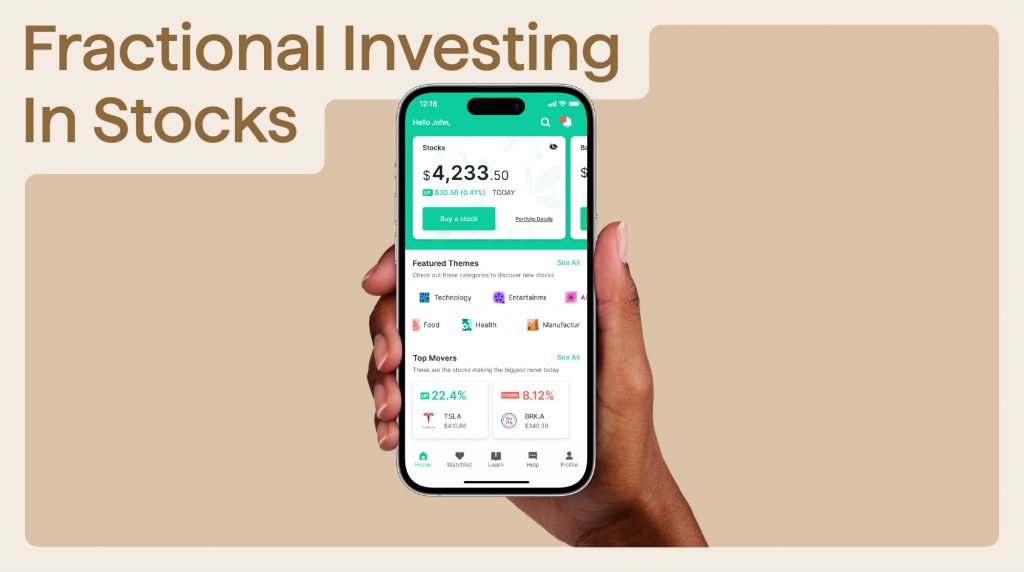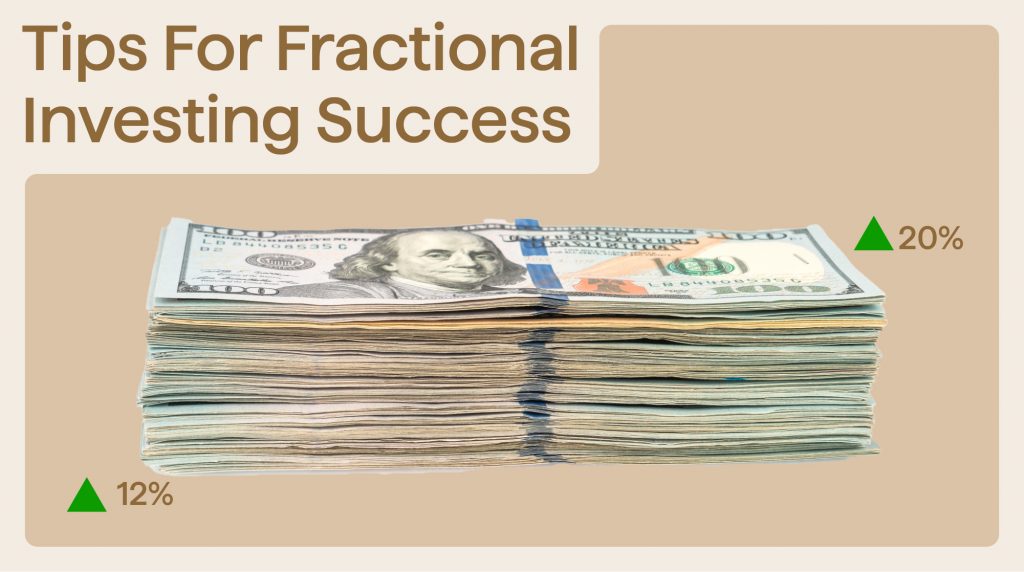In the dynamic world of finance, new opportunities for investment are constantly emerging. One such avenue that has gained traction globally and is making waves in Nigeria is “Fractional Investing.” This innovative approach allows individuals to invest in stocks and exchange-traded funds (ETFs) with even the smallest amounts of money.
In this comprehensive guide, we will delve into the intricacies of Fractional Investing in Nigeria, exploring how it works, the platforms available, and tips for success.
What Is Fractional Investing?


In the world of finance, where traditional investment models often require individuals to buy whole shares of stocks or ETFs, Fractional Investing emerges as a transformative concept. At its core, Fractional Investing revolves around the idea of breaking down the barriers to entry, enabling investors to participate in the market with amounts as small as they wish.
This method of investing is synonymous with other terms such as Micro Investing, Fractional Ownership, and Piecemeal Investing.
Breaking Down Traditions
Traditionally, investing in the stock market meant purchasing whole shares of a company’s stock. For high-value stocks, this proved to be a significant obstacle for many potential investors, especially those with limited capital. Fractional Investing challenges this traditional approach by allowing individuals to own a piece, or a fraction, of a share, regardless of its overall value.
The Mechanism Of Fractional Investing
The mechanics of Fractional Investing involve the division of a single share into smaller, more manageable units. This division is made possible through innovative brokerage platforms that support fractional trades. For instance, instead of needing to buy a whole share of a company that might be priced in the hundreds or even thousands of dollars, investors can now purchase a fraction of that share for a proportional amount of money.
Accessible to All
One of the key advantages of Fractional Investing is its democratizing effect on the investment landscape. Previously, investing in high-value stocks might have been limited to wealthier individuals or institutional investors. Now, with Fractional Investing, the doors are open to a broader audience, promoting financial inclusivity.
Micro Investing Revolution
Fractional Investing is closely aligned with the concept of Micro Investing, where individuals can start investing with small sums of money. This is particularly beneficial for those who may be new to investing or have limited funds to allocate. It transforms the perception that only large sums can participate in the stock market.
Facilitated by Technology
The rise of Fractional Investing is intricately tied to technological advancements in the financial sector. Online brokerage platforms such as Bamboo have become instrumental in making this form of investing accessible to a global audience.
These platforms handle the complexity of fractional trades, allowing investors to engage seamlessly through user-friendly interfaces.
Flexibility and Diversification
Fractional Investing not only breaks down financial barriers but also provides flexibility in portfolio management. Investors can diversify their portfolios by owning fractions of multiple stocks or ETFs, spreading risk and potentially enhancing returns. This flexibility contributes to a more tailored and diversified investment strategy.
In essence, Fractional Investing represents a paradigm shift, moving away from the exclusivity of whole share ownership to a more inclusive and flexible model. This opens up a realm of possibilities for investors in Nigeria and around the world, ushering in a new era of accessible and democratized participation in the financial markets.
How Does Fractional Investing Work?
Fractional Investing works by dividing a single share into smaller units, allowing investors to buy a portion of that share. This is facilitated by brokerage platforms that support fractional trades. Investors can own a fraction of high-priced stocks like Amazon or Google, even if they can’t afford a whole share.
Understanding the mechanics of Fractional Investing is pivotal for investors looking to navigate the world of fractional shares and embrace the flexibility it offers.
Breaking Down Whole Shares
Traditionally, investors were limited to buying complete shares of a company’s stock. Fractional Investing disrupts this conventional model by allowing investors to purchase a fraction of a share. For instance, if a stock is valued at $1000 per share, an investor can buy a fraction of that share for a proportionate amount, like $100. This ensures that investors with varying budget sizes can participate in the market.
Brokerage Platforms
At the heart of Fractional Investing are online brokerage platforms that facilitate the buying and selling of fractional shares. These platforms, like Bamboo, Trove, and Chaka, leverage technology to break down whole shares into smaller units, making them accessible to a broader audience. Investors can use these platforms to execute fractional trades with ease.
Calculating Ownership
When an investor buys a fractional share, the platform keeps track of the ownership percentage. For example, if an investor purchases $50 worth of a $500 stock, they effectively own 10% of a share. This percentage ownership extends to any dividends or gains earned from that fractional share.
Liquidity and Trading Flexibility
Fractional Investing enhances liquidity and flexibility. Investors can buy and sell fractional shares in real-time, similar to whole shares. This feature is particularly advantageous for investors who want to respond promptly to market changes or rebalance their portfolios without the constraint of whole-share units.
Dividend Distribution
When a company pays dividends to its shareholders, fractional share owners receive a proportionate share of those dividends. The dividend payment is calculated based on the ownership percentage of the fractional share. This ensures that even investors with small amounts of capital can benefit from dividend income.
Market Access
Fractional Investing also provides access to high-priced stocks that may have been out of reach for many investors. Iconic companies like Amazon or Alphabet (Google) that have shares priced in the thousands of dollars become accessible through the purchase of fractional shares.
Risk Mitigation
Fractional Investing can be a valuable tool for risk mitigation. Instead of allocating a significant portion of capital to a single stock, investors can diversify their investments across various stocks or ETFs. This diversification helps spread risk and reduce the impact of poor performance from a single investment.
Democratizing Investment Opportunities
By making high-value stocks more accessible, Fractional Investing plays a role in democratizing investment opportunities. It empowers a broader demographic, including those with limited funds, to participate in the stock market and potentially benefit from the growth of diverse companies.
In essence, Fractional Investing operates as a bridge between traditional investing models and the evolving landscape of financial technology. It not only facilitates access to a wider range of investment opportunities but also empowers investors to tailor their portfolios according to their financial goals and risk tolerance. This mechanism, driven by technology and financial innovation, is reshaping the way individuals engage with the stock market in Nigeria and beyond.
Fractional Investing In Stocks


Fractional investing in stocks has become extremely popular in recent years. Fractional Share Investing and Partial Ownership Investing give investors flexibility and diversity in their portfolios. The concept of Investing in Shares By The Slice has become popular as it allows investors to spread their funds across multiple stocks.
Fractional Investing in stocks represents a paradigm shift, providing investors with a more inclusive and flexible approach to building their portfolios. Rather than being constrained by the need to purchase whole shares, this method allows investors to own fractions of high-value stocks, making the world of stock market participation more accessible.
Democratizing High-Value Stocks
One of the primary advantages of Fractional Investing in stocks is its ability to democratize access to high-value stocks. Historically, stocks of well-established companies with high share prices like Amazon, Google, or Berkshire Hathaway might have been out of reach for many investors. Fractional Investing changes this dynamic by enabling individuals to own a portion of these stocks, regardless of the stock’s actual unit price.
Diversification Opportunities
Fractional Investing extends beyond individual stocks and encompasses Exchange-Traded Funds (ETFs). This opens up avenues for investors to diversify their portfolios effectively. By owning fractions of multiple stocks or investing in ETFs that represent a basket of stocks, investors can spread risk and potentially enhance their overall returns.
Flexible Portfolio Management
Fractional Investing allows for a more granular and flexible approach to portfolio management. Investors can allocate funds precisely according to their preferences, buying fractional shares of companies aligned with their investment goals. This flexibility is particularly beneficial for those who want to build a diversified portfolio without committing large sums of money to any single investment.
Accessible for Small Budgets
One of the standout features of Fractional Investing in stocks is its accessibility. Investors can start with very small amounts of money, making it an ideal option for those with modest budgets. This characteristic is crucial for promoting financial inclusivity, allowing a broader demographic to participate in the potential wealth-building opportunities offered by the stock market.
Ownership in Proportion
When investors purchase fractional shares, they still retain the benefits of ownership. This includes voting rights, if applicable, and a proportionate share of any dividends declared by the company. For instance, if a company pays out $1 per share in dividends and an investor owns 10% of a share through Fractional Investing, they would receive $0.10 in dividends.
Market Accessibility Through Apps
The rise of mobile investment apps has played a significant role in popularizing Fractional Investing in stocks. Platforms like Bamboo, Trove, and Chaka provide user-friendly interfaces that make it easy for investors to browse, select, and invest in fractional shares of their preferred stocks. These apps have become gateways, allowing a broader audience in Nigeria to enter the stock market with ease.
Risk Mitigation and Control
Fractional Investing in stocks inherently supports risk mitigation. Investors can diversify their holdings across different sectors or industries, reducing the impact of poor performance from any one stock. This risk control is essential for preserving capital and managing the inherent volatility of the stock market.
In conclusion, Fractional Investing in stocks is a revolutionary approach that empowers individuals to participate in the stock market, irrespective of their budget constraints. By breaking down traditional barriers, it opens up a world of possibilities, providing access to high-value stocks, diversification opportunities, and a more personalized approach to portfolio management. As this approach gains popularity, it is reshaping the investment landscape in Nigeria, fostering financial inclusion, and encouraging a more diverse and engaged investor base.
Fractional Investing Platforms In Nigeria
The emergence of Fractional Investing has been accompanied by the rise of innovative investing platforms in Nigeria that facilitate the buying and selling of fractional shares in Nigeria.
Several platforms have embraced this financial evolution, providing investors with user-friendly interfaces, diverse investment options, and the ability to engage in fractional trades. Here, we explore some notable Fractional Investing platforms making waves in the Nigerian financial landscape.
Bamboo stands out as a pioneer in the Fractional Investing space in Nigeria. This platform enables investors to buy fractional shares of U.S. stocks and Exchange-Traded Funds (ETFs) easily. With a user-friendly mobile app, Bamboo has become a go-to choice for Nigerians seeking access to global markets. Investors can start with small amounts, and the platform’s straightforward interface makes the investing process seamless.
- Trove
Trove is another prominent player in the Fractional Investing arena. This platform provides users with the opportunity to invest in both local and international stocks, including those listed on the Nigerian Stock Exchange (NSE) and major U.S. exchanges. Trove’s user interface is designed to cater to both beginner and experienced investors, offering a range of investment options to suit different preferences.
- Chaka
Chaka is an investment platform that has gained traction for its Fractional Investing capabilities. Similar to Bamboo and Trove, Chaka allows investors to buy fractional shares of U.S. and Nigerian stocks. The platform provides access to a diverse range of assets, including stocks, bonds, and ETFs. With a commitment to financial education, Chaka aims to empower investors with the knowledge needed to make informed investment decisions.
- Rise
Rise is a Nigerian investment platform that focuses on providing access to U.S. real estate opportunities. While not exclusively a Fractional Investing platform for stocks, Rise allows investors to buy fractional ownership in U.S. commercial real estate properties. This unique approach broadens the scope of fractional ownership beyond traditional stocks and ETFs.
- Wealth.ng
Wealth.ng is a comprehensive investment platform in Nigeria that offers a variety of investment products, including Fractional Investing in stocks. Investors can access both local and international markets, diversifying their portfolios with fractional shares of stocks listed on major global exchanges. Wealth.ng aims to make investment opportunities accessible to a wide range of investors, regardless of their financial capacity.
- Cowrywise
Although primarily known for its focus on savings and investment products, Cowrywise has introduced a feature for Fractional Investing. This allows users to invest in a diverse range of Nigerian and U.S. stocks with small amounts of money. The platform combines simplicity and flexibility, making it a viable option for those looking to start their Fractional Investing journey.
- Investify
Investify is a Nigerian investment platform that offers Fractional Investing in local and international stocks. With an emphasis on providing an intuitive user experience, Investify aims to empower users to invest with confidence. The platform allows investors to buy fractions of shares, making it accessible for those with limited capital.
The availability of Fractional Investing platforms in Nigeria represents a significant step towards financial inclusivity. These platforms are not just tools for executing trades; they are gateways providing individuals with access to global markets and a diverse array of investment opportunities. As the Fractional Investing landscape continues to evolve, these platforms play a crucial role in shaping the investment habits of Nigerians, fostering a culture of informed and diversified investing.
Benefits Of Fractional Investing In Nigeria


Fractional Investing comes with several advantages, especially for those with limited capital. It opens doors to a diverse range of investment opportunities and allows investors to participate in the growth of high-value stocks. Additionally, it promotes financial inclusion, enabling more Nigerians to engage in the stock market.
As this innovative approach gains popularity, it is crucial to explore the tangible benefits that make Fractional Investing a compelling option for a diverse range of investors.
- Financial Inclusivity
One of the primary benefits of Fractional Investing is its role in promoting financial inclusivity. Traditional investment models often required substantial capital to access high-value stocks. Fractional Investing eliminates this barrier, allowing individuals with even modest budgets to participate in the stock market. This inclusivity is pivotal for democratizing wealth creation opportunities and widening the investor base in Nigeria.
- Access to High-Value Stocks
Fractional Investing opens the door to high-value stocks that might have been out of reach for many investors. Iconic companies with shares priced in the hundreds or thousands of dollars, such as Amazon or Google, become accessible through the purchase of fractional shares. This grants investors the ability to diversify their portfolios with globally renowned companies, contributing to the growth potential of their investments.
- Portfolio Diversification
Diversification is a cornerstone of sound investment strategy, and Fractional Investing facilitates this effectively. Investors can diversify their portfolios by owning fractions of multiple stocks or investing in ETFs that represent a broad spectrum of assets. Diversification helps spread risk, minimizing the impact of poor performance from any single investment and potentially enhancing overall portfolio resilience.
- Flexibility in Investment Amounts
Fractional Investing provides unmatched flexibility in the amount an investor can allocate to a specific stock or ETF. This flexibility is particularly beneficial for those who want to start with small amounts and gradually increase their investment over time. Investors have the freedom to tailor their investment strategy according to their financial goals and risk tolerance.
- Real-Time Trading of Fractional Shares
Unlike some traditional investment models, Fractional Investing enables real-time trading of fractional shares. Investors can buy or sell these shares promptly, responding to market changes or adjusting their portfolios as needed. This agility is crucial for investors who want to actively manage their investments and seize opportunities in dynamic market conditions.
- Dividend Earnings for Fractional Shareholders
Fractional share owners receive a proportionate share of any dividends declared by the company. This means that even investors with small amounts of capital can benefit from dividend income. As companies distribute profits to shareholders, fractional shareholders participate in these earnings based on their ownership percentage, providing an additional stream of potential income.
- Low Entry Barriers
Fractional Investing substantially lowers the entry barriers to the stock market. Traditional models often required investors to buy whole shares, which could be a significant hurdle for those with limited capital. Fractional Investing allows individuals to start with very small amounts, making the stock market accessible to a broader demographic.
- Educational Opportunities
Engaging in Fractional Investing provides an excellent educational opportunity for investors. As individuals navigate the process of buying and selling fractional shares, they gain valuable insights into how financial markets operate. This hands-on experience can contribute to financial literacy and empower investors to make more informed decisions.
In summary, the benefits of Fractional Investing in Nigeria extend beyond just financial gains. This approach fosters a more inclusive, flexible, and educated investor community. As more individuals in Nigeria embrace Fractional Investing, the potential for wealth creation and financial empowerment becomes not only a reality for seasoned investors but also for those taking their first steps into the dynamic world of the stock market.
Risks Of Fractional Investing In Nigeria
While Fractional Investing in Nigeria presents numerous benefits, it is essential for investors to be aware of the associated risks. As with any investment strategy, Fractional Investing carries certain challenges and uncertainties that should be thoroughly understood. Here are some key risks to consider:
- Market Volatility
The stock market is inherently volatile, and this volatility is reflected in the prices of both whole and fractional shares. Prices can fluctuate rapidly based on various factors such as economic conditions, geopolitical events, or company performance. Fractional share owners are exposed to these market fluctuations, and the value of their investments can change in real-time.
- Fractional Price Misalignment
The price of a fractional share may not always precisely align with the performance of the whole share. This is especially relevant during rapid market movements or after-hours trading. Fractional prices are determined based on the overall supply and demand for the fractional shares, which may deviate from the real-time value of the whole share.
- Liquidity Concerns
While Fractional Investing enhances liquidity by allowing investors to buy and sell shares in smaller increments, there may be instances where liquidity is a concern. In times of market stress or for less commonly traded stocks, the ability to execute trades at desired prices may be limited. This lack of liquidity can impact the ease with which investors can enter or exit positions.
- Platform Reliability
The reliability of the Fractional Investing platform is crucial for a seamless and secure investing experience. Technical glitches, server downtimes, or cyberattacks can disrupt trading activities. Investors must carefully choose reputable and reliable platforms to minimize the risk of encountering such issues.
- Limited Voting Rights
Fractional share owners typically have limited or no voting rights in company matters. While this might not be a significant concern for passive investors, those who value participating in corporate decisions should be aware that owning only fractions of shares may limit their ability to influence company policies.
- Dividend Limitations
Some companies have policies that restrict the payment of dividends to fractional shareholders. While many companies distribute dividends proportionally, others may have minimum thresholds or exclude fractional shareholders from dividend payments. Investors should understand the dividend policies of the companies in which they hold fractional shares.
- Platform Fees and Costs
Fractional Investing platforms may charge fees for executing trades, managing accounts, or providing specific services. These fees can eat into the returns on investment and should be carefully considered. Investors should be aware of the fee structure of the chosen platform and assess how it may impact the overall performance of their investments.
- Regulatory Risks
The regulatory environment for Fractional Investing may evolve, and changes in regulations could impact the functioning of these platforms. Investors should stay informed about regulatory developments and be prepared to adapt to changes in compliance requirements that may affect their investment activities.
- Concentration Risk
Diversification is a key risk management strategy. However, investors who heavily concentrate their portfolios in a small number of fractional shares may be exposed to concentrated risks. If one or more of these holdings perform poorly, it can have a disproportionate impact on the overall portfolio.
Fractional Investing in Nigeria offers a gateway to the global financial markets, but investors must navigate these markets with a keen awareness of the associated risks. By understanding and proactively managing these risks, investors can make informed decisions, mitigate potential downsides, and maximize the benefits of Fractional Investing. Diversification, due diligence, and a strategic approach to risk management are essential components of a successful Fractional Investing strategy.
How To Buy Stocks On Bamboo Using Fractional Investing
Getting started with Fractional Investing on Bamboo is relatively straightforward. Investors need to choose a reliable platform, complete the registration process, and fund their accounts. The process is user-friendly. Investors can browse through available stocks and ETFs, select the desired amount to invest, and execute the trade.
This step-by-step guide simplifies the process, making it accessible even for beginners.
How To Diversify Your Stock Portfolio Using Fractional Investing In Nigeria
Diversification is a key strategy in investing. Fractional Investing allows investors to diversify their portfolios with smaller amounts of money. By investing in a variety of stocks or ETFs, individuals can spread risk and potentially enhance returns.
Diversification is a fundamental principle of prudent investing, and Fractional Investing in Nigeria provides an excellent opportunity for investors to build a diversified stock portfolio without requiring a large capital outlay. Here’s a comprehensive guide on how to leverage Fractional Investing to achieve a well-diversified stock portfolio:
- Define Your Investment Goals
Before diving into Fractional Investing, clarify your investment goals. Whether you aim for capital appreciation, income generation, or a balanced approach, understanding your objectives will guide your choice of stocks and the level of diversification you seek.
- Research and Identify Sectors
Conduct thorough research to identify sectors that align with your investment goals and risk tolerance. Nigeria’s stock market encompasses a variety of sectors, including banking, telecommunications, consumer goods, and energy. Fractional Investing allows you to diversify across multiple sectors, reducing the impact of poor performance in any single industry.
- Choose a Reputable Fractional Investing Platform
Select a reliable Fractional Investing platform that provides access to a broad range of stocks. Platforms like Bamboo, Trove, and Chaka offer diverse investment options, including both local and international stocks. Ensure the platform aligns with your investment goals and has a user-friendly interface.
- Explore Local and International Stocks
Fractional Investing platforms in Nigeria often provide access to both local and international stocks. Explore opportunities in Nigerian companies listed on the Nigerian Stock Exchange (NSE) as well as global stocks listed on major exchanges like the New York Stock Exchange (NYSE) or NASDAQ. This global exposure enhances the diversification potential of your portfolio.
- Embrace Exchange-Traded Funds (ETFs)
Consider including Exchange-Traded Funds (ETFs) in your Fractional Investing strategy. ETFs are investment funds that hold a basket of assets, such as stocks, bonds, or commodities. Fractional Investing allows you to buy small portions of these funds, providing instant diversification across multiple assets.
- Allocate Funds Across Different Asset Classes
Diversification extends beyond stocks. Allocate funds across different asset classes, such as stocks, bonds, and potentially real estate. Fractional Investing platforms may offer opportunities to invest in fractional shares of Real Estate Investment Trusts (REITs) or bonds, contributing to a more diversified portfolio.
- Consider Geographic Diversification
Explore stocks from different geographic regions to further diversify your portfolio. Investing in stocks from various countries can help reduce the impact of regional economic downturns or market-specific risks. Fractional Investing facilitates this by allowing you to own fractions of international stocks.
- Monitor and Rebalance Regularly
Regularly monitor your portfolio’s performance and assess whether it aligns with your investment goals. If certain sectors or assets have become over-weighted due to market fluctuations, consider rebalancing your portfolio. Rebalancing ensures that your portfolio maintains its desired level of diversification.
- Mitigate Concentration Risks
Avoid concentrating too much capital in a single stock or a handful of stocks. Fractional Investing allows you to spread your investment across a wide range of securities, reducing the risk associated with poor performance of individual stocks.
- Stay Informed and Adapt
The financial markets are dynamic, and economic conditions evolve. Stay informed about market trends, economic indicators, and global events that may impact your investments. Adapt your portfolio strategy accordingly to maintain an optimal level of diversification.
Diversifying your stock portfolio using Fractional Investing in Nigeria is a strategic approach to managing risk and maximizing potential returns. By leveraging the flexibility of fractional shares and exploring a variety of investment options, investors can build a well-rounded portfolio that aligns with their financial goals.
Regular monitoring and adjustments, coupled with a commitment to staying informed, form the pillars of a successful diversified Fractional Investing strategy.
What Stocks Can I Invest In Fractionally In Nigeria?
Fractional Investing in Nigeria has expanded the universe of stocks that investors can access, allowing them to buy even a small portion of high-value shares. This broadens the investment horizon for Nigerian investors.
Here’s a guide to the types of stocks you can invest in fractionally in Nigeria:
Global Blue-Chip Stocks
One of the primary benefits of Fractional Investing is the ability to invest in global blue-chip stocks that might have high share prices. Popular companies like Amazon, Google (Alphabet), Tesla, and Apple, which are listed on major U.S. exchanges, become accessible to Nigerian investors. Owning fractions of these high-performing stocks allows for global diversification.
Exchange-Traded Funds (ETFs)
ETFs are investment funds that hold a basket of assets, such as stocks, bonds, or commodities. Fractional Investing platforms often offer the opportunity to buy fractions of ETF shares. This provides investors with instant diversification across multiple assets and sectors. ETFs can track various indices, industries, or regions, allowing for a broad range of investment options.
Technology Stocks
Investors interested in the technology sector can leverage Fractional Investing to own portions of leading technology companies. This includes shares of giants like Microsoft, Amazon, and Alphabet, as well as emerging players in the tech industry. The fractional approach enables investors to participate in the growth potential of these dynamic and innovative companies.
Dividend-Paying Stocks
For those seeking income from their investments, Fractional Investing allows access to dividend-paying stocks. Companies that regularly distribute dividends, such as Procter & Gamble, Coca-Cola, or Johnson & Johnson, can be part of a dividend-focused portfolio. Investors can own fractions of these stocks and receive a proportionate share of the dividend payments.
Healthcare and Pharmaceutical Stocks
Fractional Investing facilitates investment in healthcare and pharmaceutical companies, providing exposure to a sector known for innovation and long-term growth. Fractional shares of companies like Pfizer, Johnson & Johnson, or Moderna can be part of a diversified portfolio with a focus on the healthcare industry.
Energy and Renewable Stocks
Investors interested in the energy sector, including traditional energy and renewable energy companies, can use Fractional Investing to own portions of relevant stocks. This might include fractional shares of oil and gas companies or renewable energy firms, contributing to a diversified portfolio with exposure to the energy market.
Consumer Goods Stocks
Fractional Investing allows for participation in the consumer goods sector, encompassing companies involved in the production of everyday products. Investors can own fractions of shares in companies like Procter & Gamble, Unilever, or Nestlé, contributing to a portfolio with exposure to consumer-related industries.
Financial Stocks
Fractional shares provide access to the financial sector, including banks, insurance companies, and financial services providers. Investors can own fractions of shares in well-known financial institutions, contributing to a diversified portfolio with exposure to the financial industry.
Real Estate Investment Trusts (REITs)
Some Fractional Investing platforms may offer the opportunity to invest in Real Estate Investment Trusts (REITs). REITs allow investors to own fractions of real estate assets, providing exposure to the real estate market without the need for significant capital outlay.
Fractional Investing in Nigeria opens up a vast array of stocks across different sectors and geographies. From local Nigerian companies to global giants, investors can build a diversified portfolio that aligns with their investment goals. By exploring various stocks available through Fractional Investing platforms, investors can tailor their portfolios to reflect their preferences, risk tolerance, and long-term objectives.
How Much Money Do I Need To Start Fractional Investing?
One of the remarkable aspects of Fractional Investing is its accessibility. Investors can start with very small amounts, making it suitable for those with modest budgets. The ability to invest with less than a full share makes the financial markets more inclusive.
The minimum amount required to start Fractional Investing can vary depending on the platform and the specific stocks or assets you’re interested in. Here’s a breakdown of considerations:
Low Minimum Investment Requirements
Fractional Investing platforms are designed to accommodate investors with varying budget sizes. Many platforms have low minimum investment requirements, allowing individuals to start with as little as $1 or even less. This low entry point is a key advantage, enabling financial inclusivity and making investing accessible to a broad range of people.
Flexibility in Investment Amounts
Fractional Investing offers unparalleled flexibility in the amount an investor can allocate to a particular stock or asset. Instead of needing to buy a whole share, investors can purchase fractions of shares with the exact amount they are comfortable investing. This flexibility is crucial for those who want to start small, gradually increasing their investment as they become more comfortable or as their financial situation allows.
Diversification with Small Sums
Even with a modest amount of capital, investors can achieve diversification through Fractional Investing. By spreading their investment across multiple stocks or assets, they can reduce risk and potentially enhance returns. This diversification is achievable with small sums of money, allowing investors to build a well-rounded portfolio over time.
No Need for Full Share Prices
Traditional investing models often required individuals to buy whole shares, which could be a significant barrier for those with limited funds. Fractional Investing eliminates this requirement, allowing investors to own fractions of high-value shares. This means you can invest in companies with share prices in the hundreds or even thousands of dollars without needing the full amount.
Gradual Increase Over Time
Fractional Investing enables a gradual and incremental approach to building an investment portfolio. Investors can start with a small amount, such as $50 or $100, and add to their investments over time as they accumulate more capital. This approach allows for a disciplined and systematic investment strategy, particularly for those who may be new to investing.
Cost of Fractional Shares
The cost of fractional shares is determined by the proportion of the whole share you are purchasing. For example, if a stock is priced at $1000 per share and you invest $100, you would effectively own 10% of a share. The cost of your fractional investment is proportional to the amount you choose to invest, making it scalable to different budget sizes.
Fractional Investing Fees and Costs
While the minimum investment amount required for fractional investing might be low, it’s essential to consider any fees or costs associated with Fractional Investing platforms. Some platforms may charge transaction fees, management fees, or other expenses. Understanding the fee structure is crucial for assessing the overall impact on your returns, especially when dealing with smaller investment amounts.
Tips For Fractional Investing Success In Nigeria


Fractional Investing is a powerful tool that empowers individuals to participate in the stock market with even modest amounts of money.
To make the most of this investment approach and set the stage for success, consider the following tips:
- Set Clear Financial Goals
Define your financial goals before you start Fractional Investing. Whether it’s saving for a specific purchase, building an emergency fund, or planning for retirement, having clear goals will guide your investment strategy and help you stay disciplined.
- Diversify Your Portfolio
Diversification is a key risk management strategy. Spread your investments across different sectors, industries, and geographic regions. Fractional Investing makes diversification accessible, allowing you to own fractions of various stocks and assets.
- Research Before Investing
Conduct thorough research before making any investment decisions. Understand the companies or assets you’re interested in, analyze their financial health, and consider their growth prospects. Informed decisions are essential for successful investing.
- Stay Informed About Market Trends
Keep yourself informed about market trends, economic indicators, and global events that can impact financial markets. Staying informed allows you to make well-timed decisions and adapt your investment strategy as needed.
- Regularly Review Your Portfolio
Regularly review your portfolio to ensure it aligns with your financial goals and risk tolerance. If certain stocks have become over-weighted due to market movements, consider rebalancing your portfolio to maintain your desired asset allocation.
- Be Wary of Fees and Costs
Understand the fee structure of the Fractional Investing platform you choose. Some platforms may charge transaction fees, management fees, or other costs that can impact your returns. Factor these fees into your overall investment strategy.
- Take a Long-Term Perspective
Fractional Investing is well-suited for a long-term investment approach. Instead of trying to time the market or make short-term gains, focus on the potential for long-term growth. This perspective allows you to ride out market fluctuations and benefit from the compounding effect over time.
- Have a Risk Management Strategy
Be mindful of the risks associated with investing. While Fractional Investing enhances accessibility, it doesn’t eliminate risk. Have a clear risk management strategy, diversify your investments, and only invest what you can afford to lose.
- Stay Disciplined During Market Volatility
Financial markets can be volatile, and prices can fluctuate. It’s essential to stay disciplined during market ups and downs. Avoid making impulsive decisions based on short-term market movements. Stick to your long-term investment strategy.
- Leverage Educational Resources
Many Fractional Investing platforms offer educational resources to help users understand the basics of investing. Take advantage of these resources to enhance your financial literacy and make more informed investment decisions.
- Monitor Dividends and Corporate Actions
If you invest in dividend-paying stocks, stay informed about dividend payments and corporate actions. Fractional share owners are entitled to a proportionate share of dividends, and staying aware of corporate events helps you make decisions that align with your financial goals.
- Consider Automatic Investments
Some Fractional Investing platforms such as Bamboo allow you to set up automatic investments at regular intervals. This approach, often referred to as dollar-cost averaging, can help you mitigate the impact of market volatility and build your portfolio gradually over time.
Fractional Investing provides a gateway for individuals to participate in the financial markets and build wealth over time. By adopting a thoughtful and informed approach, staying disciplined, and leveraging the benefits of Fractional Investing, you can set the stage for long-term success on your investment journey.
Fractional Investing In Nigeria: FAQS
Can I sell my fractional shares anytime?
Yes, you can sell your fractional shares anytime during market hours. However, there may be a commission associated with each trade.
How can I use fractional investing to invest in international stocks?
To use fractional investing to invest in international stocks, you will need to use a platform that offers fractional investing in international markets such as Bamboo.
How can I use fractional investing to invest in ETFs?
To use fractional investing to invest in ETFs, you will need to use a platform that offers fractional investing in ETFs. Some platforms that offer this include Bamboo.
How can I use fractional investing to invest in bonds?
To use fractional investing to invest in bonds, you will need to use a platform that offers fractional investing in bonds. Some platforms that offer this include Bamboo, Wealth.ng and Chaka.
How can I use fractional investing to create a diversified investment portfolio?
Fractional investing can be a great way to create a diversified investment portfolio. By investing in fractional shares of different stocks, ETFs, and bonds, you can reduce your overall risk and increase your chances of achieving your financial goals.
How can I use fractional investing to save for retirement?
Fractional investing can be a great way to save for retirement. By investing in fractional shares of different stocks, ETFs, and bonds, you can build a retirement nest egg that is tailored to your individual needs and risk tolerance.
How do dividends work with fractional shares?
Dividends are paid out to shareholders based on the number of shares they own. When you own fractional shares, you will receive a proportional amount of the dividend payout.
Can I participate in initial public offerings (IPOs) through fractional investing?
Yes, you can participate in IPOs through fractional investing through some platforms, such as Bamboo.
Are there restrictions on the types of assets I can invest in fractionally?
The types of assets you can invest in fractionally will vary depending on the platform you use. However, most platforms offer fractional investing in Stocks, ETFs, Real Estate, Property ownership and bonds.
Can you make money with fractional shares?
Yes, you can make money with fractional shares. Just like with any investment, there is always the risk of losing money. However, over the long term, the stock market has historically trended upwards. This means that if you invest in fractional shares of companies that are growing and profitable, you have the potential to make money.
Can you buy fractional shares of an ETF?
Yes, you can buy fractional shares of an ETF. This means that you can invest in an ETF even if you don’t have enough money to buy a whole share.
What is the best way to buy fractional shares?
The best way to buy fractional shares is to use a platform that offers fractional investing in the assets you want to invest in. Bamboo is one of the popular investment platforms that offer fractional investing in Nigeria.
Fractional Investing In Nigeria: Conclusion
Fractional Investing in Nigeria marks a revolutionary shift in the investment landscape, offering accessibility and flexibility to a broader population. As technology continues to advance, the opportunities for small-scale investors to participate in the global financial market will likely expand further.
By understanding the nuances of Fractional Investing and leveraging the available platforms, Nigerians can embark on their investment journey with even the smallest of budgets, potentially reaping the rewards of a diversified and well-managed portfolio.
The beauty of Fractional Investing is that it empowers individuals to enter the world of investing with minimal financial constraints.
Whether you have $10 or $1000, Fractional Investing allows you to participate in the stock market, diversify your portfolio, and gradually build wealth over time.
The low entry requirements make investing more accessible and inclusive, fostering a culture of financial empowerment for a diverse range of investors in Nigeria.
Join over 500,000 Nigerians who are gradually building wealth over time via fractional investing today. Download the Bamboo app now to get started.



